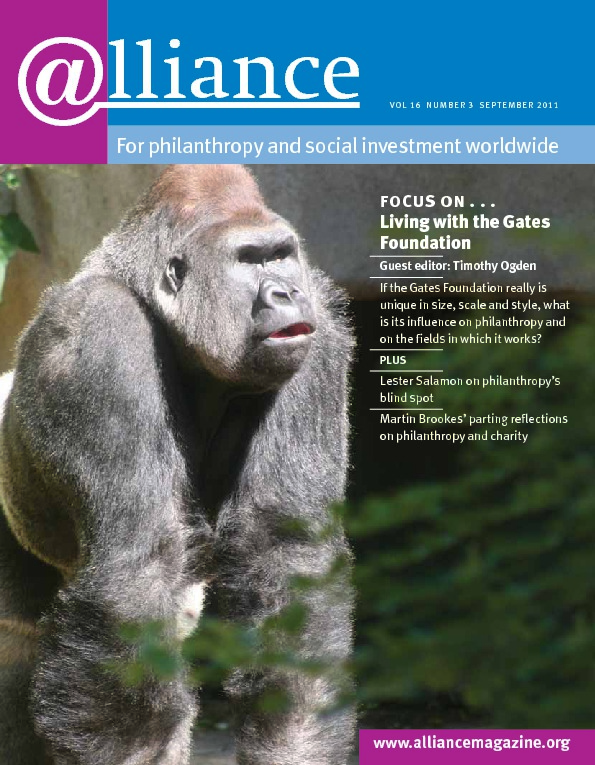‘There is a logical sequence of events in human life: you go to school, you marry, you divorce… Then maybe the time comes to retire from business and start philanthropy.’
The Gates Foundation and Giving Pledge are well known in the US, but what of elsewhere? High-profile visits to India and China have not resulted in the kind of positive responses that the Gateses and Warren Buffett might have hoped for, but what about the other BRIC nations? Olga Alexeeva spoke to Dr Dmitry Zimin, president emeritus of the Vimpelcom telecommunications company and founder of the Dynasty Foundation, about how he and others in Russia see Bill Gates as both philanthropist and businessman.
What influences are shaping the development of philanthropy in Russia?
It seems to me that the development of philanthropy in Russia and around the world is rooted in human nature, in the human genes, if you will. There is a logical sequence of events in human life: you go to school, you marry, you divorce … Then maybe the time comes to retire from business and start philanthropy. I see philanthropy as one of the logical natural steps in people’s life sequence, in a businessman’s life in particular. Another factor of course is the institutional environment for philanthropy, and public attitudes, which in Russia have never been very supportive.
There are very few people in the world who have donated most of their wealth to philanthropy. In Russia you are the only one who has actually done that. Where is the logical natural sequence then?
Russian business was all started at about the same time, so as businessmen we are all of the same age. It just happened that biologically I am one of the oldest in this generation. This is all my uniqueness, I think. When younger businessmen reach my age, they will all be philanthropists.
Let’s hope for this! What do you think about philanthropy in Russia today?
As I said earlier, I think Russia lacks the institutional environment for philanthropy. For example, tax benefits are not available for any kind of donor. Russians have never been brought up with sympathy for charitable work and giving, and this is what hinders development now.
Also, I think as with any other activities in Russia, Russian philanthropy is burdened by our ineffectiveness. As business is run ineffectively and often in the shadows, so is philanthropy. And I don’t think the reason for that is the Russian people themselves but our archaic systems of governance and decision-making. Everything in Russia is enveloped in this archaic system of doing things. But as always, of course, there are excellent examples of effective management, decision-making and activity, both in business and in philanthropy.
Do you think the activities of the Gates Foundation, and especially the Giving Pledge, have made an impact on the development of philanthropy in Russia? And if so, in what way?
Probably it has made an impact – it should have done – but I am not aware of any concrete examples. I believe that Bill Gates’ example in building his business is no less interesting – and it is not only him. Take, for example, Mark Zuckerberg – he is a very interesting guy. One can only envy a country that has such businessmen and philanthropists.
Can Bill Gates be seen as a role model for Russian philanthropists? Should they follow in his footsteps?
The environment in our countries is very different so I don’t think it is appropriate to speak about following any examples. Many people will naturally choose this path but not because they want to follow Bill Gates. There are lots of tasks that business solves more effectively within the framework of philanthropy than the state.
What are these tasks?
The state should focus on issues that affect everyone: mass education, healthcare, security and defence. These are classic state duties. But there is a whole list of things that the state as a bureaucratic machine cannot do effectively by definition. These are issues that are not affecting the masses but rather those where one needs to find complex individual solutions or tailor programmes to individual needs. One such area is, for example, search and support for talent.
But Bill Gates does deal with issues that are the traditional responsibilities of the state: mass education, mass healthcare problems …
Gates deals with education where the state does it badly or does nothing at all. Don’t get me wrong, I don’t think philanthropy is a marginal activity, somewhere on the fringes of public life. Philanthropy comes where it is needed, where there are real problems. It is one of the most important elements of public life and there are many areas where without philanthropy nothing would have been achieved.
One of the most common accusations of philanthropy, including the Gates Foundation, is that it creates dependency or infantilism, that donors and charities solve people’s problems for them. Do you agree with that?
I agree that dependency is a great problem, and neither Bill Gates nor the state want to encourage dependency on welfare or charity among ordinary people. We should recognize that there is a dilemma here: help is needed and at the same time there is a risk of creating dependency through providing it. Something to keep in mind when we develop our programmes and strategies …
What do you think about the Giving Pledge? Bill Gates recently travelled to China and India and met entrepreneurs there. He got a polite and nice response but no excitement. In future he might come to Russia …
I have deep respect for Bill Gates. Bill Gates is a man in front of whom I would take my hat off. Still, I think the problem could be that it is worth talking to people before making high-level propositions. If I were in Bill Gates’ place, I would go to India as a tourist: walk the country, learn and get to know people. I would not come as a preacher, as I guess he might have been taken for a preacher there.
When a famous successful person starts behaving as a preacher, things just start to go wrong. A good example is Alexander Solzhenitsyn. Later in life he considered himself a preacher and his laurel wreath started fading instantly.
If Bill Gates wants to be heard, maybe he should start by listening to the people he approaches first, talk with them as peers, and then maybe he will decide not to say anything at all!
The Dynasty Foundation
Founded in 2002, the Dynasty Foundation was the first charitable family foundation in post-Soviet Russia. It is now managed by a board of directors, who make decisions about strategic development and set the foundation’s priorities: to seek out talented scholars, scientists and educators and support their projects in the natural and social sciences.
For more information
http://www.dynastyfdn.com
 Is the Gates Foundation influencing philanthropy in China, Alliance asked Dr Feng Lun, Chairman of the Singapore-based World Future Foundation.
Is the Gates Foundation influencing philanthropy in China, Alliance asked Dr Feng Lun, Chairman of the Singapore-based World Future Foundation.
Currently, both public and private foundations in mainland China have made great progress in terms of numbers and size, and many have established an online presence. The One Foundation, in particular, has established a philanthropy research institute with great local effect. But the Bill and Melinda Gates Foundation is not regarded as playing an important role in the development of China’s philanthropy and charity sector.
In fact, we do not know too much about the Gates Foundation in China. They have featured in the media a few times, but they have hardly taken part in local activities for charity. Its influence lies only in a few projects or occasions, but its influence on organizations, ideas and professionals of philanthropy in China is limited.
We had an opportunity to learn more about the Gates Foundation at the charity banquet held by Warren Buffett and Bill Gates last year, but we haven’t received news or had contact with the foundation since the banquet. Overall, we do not feel their influence in China.
For more information
http://www.worldfuturefound.org






Comments (0)